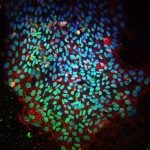Lien vers Pubmed [PMID] – 26009823
Shock 2015 Sep;44(3):245-51
Glucose toxicity may play a crucial role in evoking neurologic complications of critical illness. We studied whether the neuropathological alterations in fatal human critical illness observed under hyperglycemia are present and can be attenuated by maintaining normoglycemia in a mouse model of prolonged sepsis induced by cecal ligation and puncture. Mice were randomized to moderate hyperglycemia (>8.3 mmol/L, n = 8) or normoglycemia (4.4-6.7 mmol/L, n = 8). After 5 days, hippocampus and frontal cortex from septic mice were compared with those from healthy controls (n = 8). Blood glucose was 7.8 ± 1.3 mmol/L in hyperglycemic and 6.1 ± 0.7 mmol/L in normoglycemic critically ill mice (P = 0.007). The percentage of damaged neurons was twofold higher in frontal cortex (P = 0.01) and hippocampus (P = 0.06) of hyperglycemic ill mice than that of healthy mice. In frontal cortex, neuronal damage was attenuated under normoglycemia (P = 0.04). Critical illness reduced astrocyte density and activation status fourfold in hippocampus (P ≤ 0.02), but not in frontal cortex, irrespective of glycemic control. Microglia were twofold to fourfold more abundant in both brain areas of hyperglycemic critically ill mice (P ≤ 0.002), but only in frontal cortex were they reduced in number with normoglycemia (P = 0.0008). The density of apoptotic cells and abundance of carbonylated proteins were significantly higher than normal in frontal cortex of hyperglycemic ill mice only (P = 0.05). In a mouse model of prolonged polymicrobial sepsis, remarkable neuropathological changes develop with neuronal damage, impaired astrocyte activation, increased microglia, apoptosis, and accumulation of carbonylated proteins. These changes were partially prevented or attenuated when hyperglycemia was prevented with insulin. Frontal cortex appeared more vulnerable to hyperglycemic insults than hippocampus.




